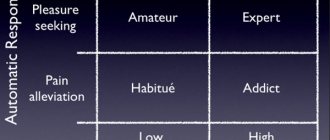What it is?
All words associated with humanism are based on the Latin word “homo” , which translates as “man” .
This is partly due to the general meaning of the concept: humanism implies that life, and especially human life, is the highest value.
Partly - with the fact that such qualities as kindness, mercy, humanity are inherent only to people and belong to the highest human qualities, and are also closely related to the ideas that are included in the concept of “humanism”.
Humanism is a definition denoting a system in which human life, human comfort, safety, freedom, health and happiness become the most significant and important.
This concept has a lot of other, narrower meanings, but the basics remain the same. Also, different philosophical movements interpret this definition in their own way.
For example, for Marxism , humanism has nothing to do with individualism, and social comfort is defined as more significant, and the comfort of individual people as less significant.
Most developed countries, one way or another, are humanistic.
The word “ humanity ” is equivalent in meaning to the more familiar word “humaneness” and denotes such highest qualities of people as mercy, willingness to support and help, respect, philanthropy, and the desire to choose the path of non-violence.
Different researchers, public and creative figures mean something different by humanity.
For example, Josh Walter believes that humanity implies non-violence, a willingness not to cause pain or discomfort to anyone to the extent that it is realistic to do so. He is of the opinion that humanity consists of three components :
- altruistic aspirations;
- moral;
- volitional efforts that allow a person to suppress his own negative qualities and choose the path of humanity.
Without them, he believes, there can be no talk of humanity.
Accordingly, people with a humanistic worldview :
- strive to renounce violence;
- believe that human life and happiness are the most important thing;
- in the process of life they try to restrain their own selfishness and other negative qualities and choose a path that meets their ideas about humanity and justice;
- accept the right of other people to live the way they want, as long as it does not harm anyone;
- are of the opinion that the state should create conditions for a comfortable, safe and happy life for people;
- realize that people are not ideal and have a lot of shortcomings, but believe that in the process of development of human civilization it is possible to cope with many problems;
- We are convinced that a person’s abilities for creativity, self-development and adaptation have no limitations.
Many humanists consider themselves atheists and deny the existence of supernatural entities. They look at reality critically and encourage a scientific approach.
Despite the fact that there are religious forms of humanism, this ideology inherently has nothing to do with religiosity.
As already mentioned, the foundations of a humanistic worldview are laid in childhood : they explain to the child that causing harm is unacceptable, develop his empathy so that he can better understand those around him and be ready to provide all possible help to those who need it.
Types of humanism
Different thinkers divide humanism into many different types. Some of these types are known as:
Renaissance humanism
Known as classical humanism; it is a spirit of learning that developed at the end of the Middle Ages with the revival of classical writing and a new faith in the ability of people to determine truth and falsehood for themselves.
Secular humanism (secular)
Secular humanism rejects theistic belief and the existence of a supernatural world. That is, for them, supernatural beliefs cannot be supported by rational arguments, and therefore supernatural aspects associated with religious activity must be rejected.
Religious humanism
Considers himself religious or embraces some form of theism, deism, or the supernatural, without necessarily having any affiliation with an organized religion.
These humanists believe that secular humanism is too coldly logical and ignores the entire emotional aspect that makes people human.
Read more about religion.
Posthumanism
Philosophy of the late 20th century. She attempts to bring Renaissance humanism into the modern technological world and counter accusations of species discrimination (the superiority of one species over another, usually the human species) and anthropocentrism (the belief that humans are the center of the world's existence).
These accusations were aimed at humanitarianism.
Marxist humanism
The interests of the working people are considered the most important; they are opposed to the interests of the “oppressors” and “bourgeois pseudo-humanism.”
This is proletarian or socialist humanism, which is a new leap in the development of humanism and a consequence of the critical processing of humanistic ideas of the past.
Integral humanism
A political philosophy developed in India in the 1960s, in opposition to Western political philosophies (which, according to the founders of this humanism, were preoccupied with materialism and neglected the social well-being of the individual).
The founders saw in both capitalism and socialism imperfect ideas that stimulate greed, class antagonism (the clash of interests of the social classes of society, manifested in class struggle), exploitation and social anarchy.
See also the meanings of Existentialism and Philosophy.
Examples
A person’s conviction in the correctness of his words and actions is the basis of any worldview .
If a person, when making a decision, is guided by ideas that are part of humanism, then his worldview can be considered humanistic.
Examples:
- Oksana is a teacher. She is convinced that every child has great value and potential that can be unlocked if they put in the effort.
Even in difficult situations, she strives to make decisions that she believes will benefit the children's development and will not harm their mental health. She is also sure that children cannot be put under pressure, rigid ideological and religious guidelines cannot be imposed on them, and that each child must make their own choice. She tries to accept the characteristics of all children, even those who are called “difficult,” and find an approach. - Vasily works as a paramedic in an ambulance, and his view of work and patients differs from the views of most other paramedics, who believe that going to the homeless and alcoholics lying under benches is a thankless task and it would be better if no one calls such people. He tries to help everyone and, just in case, conducts a thorough examination of even those people who, at first glance, do not need any help, in order to be sure that everything is done correctly. He is of the opinion that every person is important.
- Svetlana, a mother of three children, is broad-minded and has clear principles of life closely related to humanity. She consciously renounced any violence against children and believes that violence for “educational purposes” is unacceptable and inevitably leads to the development of mental disorders. Svetlana approaches every difficulty from a constructive point of view, and in every conflict situation she tries to explain her position to the children and offers compromises, despite the fact that this is not always easy. She also tries to teach children to look at reality critically and rely on scientific research when analyzing certain situations.
Humanism in one form or another can be found in most works of art: in books, films, cartoons.
In computer games with a non-linear plot, the player is systematically asked to make a moral choice in certain situations, based on the circumstances, and only he can decide whether to act humanely or not.
In the famous modern cartoon “Puzzle,” the plot is based on the idea that every human emotion is important and useful, even those that, at first glance, look unpleasant and unnecessary.
This also has a direct connection with the ideas of humanism, with humanity.
Modern humanism is more focused on the comfort and happiness of individuals, on individualism.
Therefore, in artistic content there are increasingly situations in which characters make a choice in favor of their own dreams and desires, rather than following the lead of society or the state.
How to start a new life and change yourself? Advice from psychologists will help you.
Advantages and disadvantages
The ideas of humanism, as already mentioned, are interpreted by each ideology and philosophy in their own way, and within each of them it can receive its own set of pros and cons. Let us give their characteristics.
The main advantages of the humanistic worldview:
- conscious renunciation of violence has many positive aspects;
People who choose the path of non-violence will not be able to cause serious physical and mental harm to their children, friends, lovers, parents, and life and interaction with such people will be pleasant and peaceful. - people learn to better understand others, their empathic abilities grow, which facilitates social interaction, reduces the number of conflicts and makes it easier to restore relationships in case of quarrels;
- people better understand the importance of mutual assistance and are ready to extend a hand to their neighbors;
- they are also more understanding of their own needs and desires, realizing that their happiness and well-being matter, as a result, their risk of developing mental illnesses, especially neuroses and depression, is reduced;
- the younger generation is being brought up within the framework of a humanistic approach, which excludes violence and cruelty and welcomes a constructive approach;
- children are taught and raised in such a way that both learning and upbringing bring them joy and pleasure, which increases their motivation and interest in learning;
- Children's needs and desires are respected and they are not required to provide emotional or other services.
Disadvantages of a humanistic worldview:
- Like any idea, humanity changes in the perception of different people. Each idea, if desired, can be distorted, brought to the point of absurdity, adjusted to one’s own desires, or simply misunderstood.
For example, a child who was taught to value others and help them as much as possible, but was not taught how to protect his own boundaries and how to act in potentially dangerous situations, may get into trouble if he wants to help someone.Therefore, it is important for parents and educators to comprehensively consider such issues with their children.
- Since the interpretation of humanism and humanity is ambiguous, even within a community of people who believe that their worldview belongs to the humanistic, conflicts may arise, especially related to pressing social issues related to abortion, euthanasia, and prenatal diagnosis. What is humane for one person is inhumane for another.
Secondly, this is the fundamental, deep nature of the humanistic worldview.
⇐ PreviousPage 13 of 44Next ⇒Here a person accepts not just his humanity, but the deepest and most valuable thing in himself - his humane self
. Humanism acquires depth precisely because it is connected with the most important thing for a person - with his own existence, with his freedom, positive, life-affirming abilities, with all the best that is or can be inherent in a person who does not close his eyes to the dark side of his being. Unlike all other worldviews, at the center of humanism is a person, the bearer of this worldview.
A sign that speaks of the more fundamental nature of humanism compared to other types of worldview is especially pronounced reflexivity, consciousness
a person of humanistic views, his extremely close contacts with his
self, the personal center of thought and deed
.
This mentality can be called anthropocentrism (but not egoism). This definition term describes the situation quite accurately. Indeed, in a humanistic worldview I
make an extremely important choice of myself, but not just a “bare” and meaningless one (which happens in any act of self-consciousness), but
me
, worthy of the highest human values, commensurate with all the values of the Universe. Humanism is a worldview of high self-awareness, self-control and individual responsibility for one’s private, public and cosmic (natural or environmental) life.
Let us emphasize once again: all other worldviews (such as religious, statist, class, professional and their varieties) do not at all consider the individual as the main object of their positive interest.
The third feature of humanism is its complex, integrative nature.
The point is that awareness and acceptance of humanity, of oneself as a humane self
creates a special soil for the organic and creative perception of many other worldviews or their parts.
Humanism becomes a filter
through which a person passes all the content of his inner world, thereby purifying it and filling it with the light of humanity. As a result, the humanistic worldview includes many philosophical, ethical, natural science, civil law, financial and economic, general political, aesthetic, environmental, psychological and pedagogical ideas.
The fourth quality of humanism is its multifunctionality.
Polyfunctionality (multifunctionality) is inherent in almost all worldviews. In humanism, this quality allows a person to solve both theoretical (cognitive) problems and practical (moral, civil, etc.) issues.
Humanism performs the functions of method, value and knowledge
: he teaches,
- how to become a humanist,
Or, in more detail -
– how to form a humanistic worldview in yourself;
– how to consciously and humanely (humanistically) relate to oneself, information and the outside world;
– what is the scale, the catalog of basic human values and priorities.
He offers himself to the individual as knowledge
, illuminated by the light of reason, warmed by the warmth of respect, care and love for man and the world.
What has been said about the “geography” of a person’s inner world and the distinctive features of the humanistic worldview helps answer the question of what a humane person Homo humanus is. This answer turns out to be very simple.
Homo humanus is a person who has a humanistic worldview and observes its self-evident norms in his life, in relationships with his own kind, society and nature.
But the simplicity of the answer does not mean that it is easy to become a humanist. Unfortunately, it is not. It takes intelligence, good will, responsibility and courage to take the risk of making a humanistic choice and embark on the road of endless and exciting ascent. Ascent to the heights of your own spirit, humanity and freedom, to the heights of knowledge, to the far reaches of nature, shrouded in the unknown and fraught with incredible discoveries...
Being a humanist is not easy because humanism is constant creation, a creative attitude towards life.
Humanistic creativity presupposes a program of self-improvement, and the search for the best - democratic, free and fair forms of community life, and the development of mutually preserving, safe, equal and partnership relations with the environment.
But who said that life is easy, carefree, cloudless and weightless?! What should she even be like? Only a deceiver or a “lucky” person with atrophied abilities for independent self-preservation and survival could say this.
The life of each of us is an incredibly small possibility that has become an amazing reality. This is an exciting adventure, a chance to experience a lot, learn a lot, do a lot. This is a chance to become a person with self-respect and self-esteem. This is a chance to respect and love a person and the world.
And, we add, to receive from them reciprocal love and gratitude, sunlight and clean air, clear water, the endless variety of gifts from the earth and human creativity.
Questions for self-control
1. How does humanism understand the reality and self-evidence of man?
2. What are the main types of human qualities?
3. Name positive human qualities.
4. What are the main neutral human qualities? What is their feature?
5. Name the main negative qualities of a person. What are their specifics?
6. What is the attitude of humanism towards the negative traits of a human being?
7. Name the main characteristics of a person’s inner world.
8. Why is it so important for a person to find out the relationship between himself and his inner world?
9. What are the main types of relationships between a person and his worldview?
10. What are the humanistic recommendations for harmonizing the relationship between a person and his inner world?
11. How humanism characterizes the human self
, personality?
12. What are the main signs of personal existence?
13. How is the definition of a person related to his ability to self-development and self-creation?
14. How humanism understands self-awareness and how it is related to the phenomenon of the human self
?
15. What is the internal structure of the human self?
?
16. What are the basic principles of a person’s attitude to his worldview?
17. How does humanism define humanity?
18. What is the structure of man as a physical-psychic being?
19. Give a description of the structure of the worldview. What are the features of the humanistic worldview?
20. What is the multifunctionality of humanism?
21. What are the main characteristics of Homo humanus?
Chapter three. HUMANISTIC WORLDVIEW
The words in the title form the main theme of this entire book. Everything that was said above was a precondition for understanding the main thing: the specifics of humanism as a worldview, as a social phenomenon and as a practice of people
, embodying the principles and ideals of this worldview into culture and everyday life.
Humanism has never been a pure theory, a game of the mind, or just a fantasy. It has always united active and creative people. The very fact of their unity and solidarity made the ideas of humanism a collective, social worldview. And since we were talking about the very way of their life, humanism was embodied not only in works of literature and art, but also in civilized, moral and reasonable relations between people, in the economic, legal and political institutions of society, which increasingly determine the appearance of each country and its citizens .
General principles of humanism
The fundamental provisions of the humanistic worldview are the following.
† Humanism is a worldview centered on the idea of man as the highest value among all conceivable spiritual values. Personality in humanism is defined as the original reality, absolute in relation to itself and relative (one of many) among all others.
Without realizing and appreciating himself, a person cannot know and appreciate everything else.
equality exists or should exist
man as a material-spiritual being in relation to another person, nature, society and all other realities and beings known or not yet known to him.
That is, he denies the existence of something higher
than man, be it a principle, society or, say, God.
† Within the framework of humanism, the possibility of genesis, evolutionary generation, creation or creation of personality is allowed, but reduction is rejected, i.e. mixing
the essence of man to the inhuman and impersonal: nature, society, the otherworldly, non-existence (nothing), the unknown, etc.
The essence of a person is the essence acquired, created and realized by him in himself and in the world in which he is born, lives and acts..
Man is a creation
, a being who, at the final stage of its formation, participates in the birth of itself as a reasonable, self-aware, worthy and equal partner of society and the world.
† Humanism, thus, is a secular, worldly, civil worldview developed by man and passing from person to person, expressing the idea of the absolute dignity of the individual, its externally relative, but steadily progressing to the absolute independence, self-sufficiency and equality
in the face of society and the world, known and unknown in it.
† Humanism is a modern form of realistic psychology and human life orientation, which includes rationality, criticality, skepticism, empathy, stoicism, tolerance, restraint, prudence, optimism, love of life, freedom, courage, hope, fantasy and productive imagination.
† Humanism is characterized by confidence in the unlimited possibilities of human self-improvement, in the inexhaustibility of his emotional, cognitive, adaptive, transformative and creative abilities.
† Humanism is a worldview without boundaries, since it does not alienate anyone who does not consider themselves its opponent, it presupposes openness, dynamism and development, the possibility of a radical revision of its positions in the face of changes and new perspectives for man and the world.
† The humanistic worldview includes the requirement to recognize the presence or possibility of the inhumane in the individual, not to ignore, but to strive to limit as much as possible the power and sphere of influence of the dark side of human nature.
Moreover, humanism is full of confidence in the ability of people to more and more successfully and reliably curb their negative qualities in the course of human self-improvement and the progressive development of world civilization.
† Humanism, like any worldview, is considered as a phenomenon, fundamentally secondary
in relation to a person and people, including humanists - groups or social strata of the population that actually exist in any society. Humanism is inseparable from the self-awareness of real people, who are aware of the possibility of unfair use of the ideas of humanism to the detriment of a person and are therefore critical, striving to take control of the natural tendency of any idea to dominate a living person, to subordinate it to their power.
† As a social phenomenon, humanism is the desire of people united by a humanistic worldview to practice its principles for the benefit of one and all, to move towards the maximum possible humanization of relations between man and man, man and society, man and state, society and state.
† Humanism is more than just an ethical doctrine, since it aims to bring together and systematize all areas and forms of manifestation of human humanity. This means that within the framework of a humanistic project, moral, civil, political, social, national and global, philosophical, aesthetic, scientific, life-meaning, environmental and all other human values are integrated and cultivated at the level of worldview and lifestyle.
†Humanism is not and should not be an ideology or any party political program
, i.e. a social ideological movement that organizes, mobilizes and directs people to achieve certain political or other goals related to the dominance and power of some people over other members of the national or world community.
At the same time, humanism helps to clarify the range and affirm the legitimate diversity and pluralism of political values, which only requires the recognition of universal human values as their common basis
.
In dialogue, competition and the exchange of political ideas in society, humanism is capable, ready to perform and performs such functions as communicative
(function of message or broadcast)
, integrative
(function of unification),
coordinating
(function of coordination and organization) and
conciliatory
(function of reconciliation, search for compromise and consent).
It offers all legal, non-dictatorial and non-extremist political parties and movements a holistic, open and dynamic system of general political and social values .
capable of humanizing political trends, institutions and relationships.
† Not being an ideology, humanism is not and should not be an official state doctrine (unless such a “doctrine” of human and civil rights is considered), nor is it any form of religion.
The humanistic worldview is alien to the recognition of the reality of the supernatural and transcendental (otherworldly), worship and submission to them as superhuman priorities.
A person with a humanistic worldview rejects the spirit of mysticism and anti-rationalism, which, as practice shows, certainly claims power in the state and leads to bureaucracy, bureaucracy, dogmatism and fanaticism, and their extreme form - totalitarianism
† Humanism is a modern scientifically oriented skepticism, which recommends a sober and critical attitude towards the so-called paranormal, psychic, occult, magical, spiritualistic, clairvoyant, astrological, telekinetic, etc. phenomena. The rule of humanism is that an independent and objective scientific study of claims about such phenomena is necessary.
A distinction should be made between anomalous or unknown natural phenomena and unexplored human reserve capabilities, on the one hand, and statements about such phenomena and capabilities as allegedly going beyond the limits of the natural, on the other.
† The ideas of humanism cannot be used to achieve goals that are contrary to it. Its principles are generally consistent with the provisions of the Universal Declaration of Human Rights, the international covenants on economic, social, civil, political and cultural rights, the European Convention for the Protection of Human Rights and Fundamental Freedoms and other documents of a universal and regional nature.
* * *
So, in humanism there is a requirement to consider this worldview itself as secondary in relation to man. It is man, his naturally inherent humanity, that constitutes the highest value and it is he who is more valuable than any worldview, including the humanistic one. He and his practical way of life are paramount in relation to any, even brilliantly formulated, humanistic doctrine or program. (This is what does not allow humanism to freeze on any principles or achievements; it eternally moves it forward.)
The organizational and social meaning of this provision is to cultivate the greatest possible openness and democracy of humanistic movements, societies and institutions. For the practice of humanistic education, this means obligatory adherence to civilized and balanced forms of discussion and assessment of points of view that are oppositional or opposite to humanism, which does not at all exclude certainty, consistency, determination and courage in the embodiment and defense of humanistic values.
Particularly correct should be the work of involving citizens in the process of humanization of human relations, the formation of humanistic public institutions and movements of secular, civil humanism. The main thing here is the consolidation of people who already consider themselves humanists or are ready to recognize themselves as such. This is promising, since there really are a lot of them, even in a country with such a complex historical destiny as Russia.
Of paramount importance for the development of social humanism are horizontal
, i.e. non-state, non-party political and non-ideological relations between people and public organizations. This involves the formation and strengthening of civil society.
When we talk about organized humanism, its psychology, methods of work and the dissemination of its ideas, we are talking, in particular, about the prohibition of using methods of personal or corporate suggestion, management and manipulation of people. Psychologically and pedagogically, humanism is advice
a person to understand his inner world,
an offer
to restore order in it. A humanistic call is, ultimately, a call for a person not to accept something from the outside with uncritical indifference, but first to find himself with the help of his own mind and available objective possibilities, this is a call to reach himself, to reveal in himself the positive foundations of his value, freedom , dignity, self-respect, self-affirmation, creativity, communication and equal cooperation with one’s own kind and with all other – social and natural – no less worthy and amazing realities.
The self-criticism of the humanistic worldview is not a purely theoretical requirement. More important for him is the practical ability not to be an enemy to himself and others. Yes, no matter how unexpected it may sound, humanism must take care of its health. And although it cannot be absolute, one must strive for such a state. What are the most dangerous and most likely diseases of humanism, its internal enemies?
Firstly, this is a widespread virus of dogmatism and
associated
fanaticism
, which are equally dangerous for both marginal and sectarian, and for popular and mass ideas, worldviews and ideologies. (It is an irony of historical fate that Marxism-Leninism, which declared itself the most flexible, self-critical, scientific, dialectical theory, corrected by practice, ultimately turned out to be the largest dogmatic and totalitarian ideological construct of the twentieth century.)
Secondly, there is a danger of turning the humanistic worldview into a political ideology or quasi-religion
, which will fundamentally distort its spirit and essence.
Thirdly, this is the danger of perfectionism
, i.e. obsessive desire for such “purity” and perfection of theory, which will lead humanism as a system of ideas to the loss of common sense and realism, will close experience, novelty, and the possibility of change for it and will turn this worldview into its own kind of elitist intellectual amusement, or even into a manic disease .
These are the general principles of humanism. Some of them should be discussed in more detail.
⇐ Previous13Next ⇒











